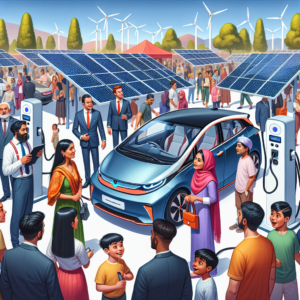Unveiling the Future: Shocking Trends Reshaping the Car Market Today
[caption id="attachment_32016" align="alignnone" width="639"] Sustainability - New Electric Vehicles[/caption]
The automotive industry is undergoing a seismic shift, driven by technological advancements, changing consumer preferences, and a growing emphasis on sustainability. As we navigate through 2023, the landscape of the car market is not only dynamic but also complex, with various trends emerging that promise to reshape the future of mobility. From the rise of electric vehicles (EVs) to the integration of autonomous driving technology, the industry is at a crossroads, where innovation and consumer demand are dictating the direction of growth. This article delves into the key trends that are currently reshaping the automotive market, offering insights into what the future may hold for manufacturers, consumers, and the environment.
1. Introduction: Understanding the Dynamic Landscape of the Automotive Industry
The automotive industry has long been a cornerstone of global economies, but it is currently experiencing unprecedented changes that challenge traditional business models. Factors such as technological innovation, regulatory pressures, and shifting consumer behaviors are converging to create a new paradigm. The rise of digital technologies, coupled with an increasing awareness of environmental issues, has prompted manufacturers to rethink their strategies and product offerings. As we witness the convergence of various trends, it becomes essential to understand how these elements interact and influence the overall trajectory of the automotive market. The future of mobility is not just about cars; it encompasses a broader vision of transportation that prioritizes sustainability, safety, and connectivity.
2. The Rise of Electric Vehicles: A Paradigm Shift in Consumer Preferences
Electric vehicles have emerged as a dominant force in the automotive market, reflecting a significant shift in consumer preferences. With growing concerns about climate change and air quality, consumers are increasingly opting for EVs over traditional gasoline-powered vehicles. Major automakers are responding by expanding their electric lineups, investing billions in research and development to enhance battery technology and charging infrastructure. Governments worldwide are also playing a crucial role by implementing incentives and regulations that encourage the adoption of electric vehicles. As a result, the EV market is projected to grow exponentially in the coming years, fundamentally altering the competitive landscape and prompting manufacturers to innovate continuously to meet consumer expectations.
3. Autonomous Driving Technology: Transforming Safety and Mobility Standards
The advent of autonomous driving technology is set to revolutionize the automotive industry by enhancing safety and redefining mobility standards. Companies are investing heavily in research to develop self-driving systems that can significantly reduce human error, which is a leading cause of road accidents. As advancements in artificial intelligence and machine learning continue to evolve, the potential for fully autonomous vehicles becomes increasingly feasible. This technology not only promises to improve safety but also offers new mobility solutions for underserved populations, such as the elderly and disabled. As regulatory frameworks adapt to accommodate these innovations, the integration of autonomous vehicles into everyday life is anticipated to reshape urban planning and transportation systems.
4. Sustainability Initiatives: How Eco-Friendly Practices Are Reshaping Production
Sustainability has become a central theme in the automotive industry, with manufacturers adopting eco-friendly practices throughout the production process. From sourcing raw materials responsibly to implementing energy-efficient manufacturing techniques, companies are recognizing the importance of reducing their carbon footprint. Many automakers are committing to ambitious sustainability goals, including achieving carbon neutrality by specific target dates. This shift is not only driven by regulatory requirements but also by consumer demand for greener products. As a result, the industry is witnessing a surge in the development of sustainable materials, such as recycled plastics and bio-based composites, which are being integrated into vehicle design. This commitment to sustainability is reshaping the entire supply chain and fostering innovation in eco-friendly technologies.
5. The Impact of Digitalization: Enhancing Customer Experience and Connectivity
Digitalization is transforming the automotive landscape, enhancing customer experience and connectivity in unprecedented ways. The integration of advanced technologies such as artificial intelligence, the Internet of Things (IoT), and big data analytics is enabling manufacturers to offer personalized experiences to consumers. Features like over-the-air software updates, in-car connectivity, and smart navigation systems are becoming standard in modern vehicles, allowing drivers to access real-time information and services. Additionally, digital platforms are facilitating seamless interactions between consumers and manufacturers, from online purchasing to virtual showrooms. As the automotive industry embraces digital transformation, the focus is shifting towards creating a holistic ecosystem that prioritizes customer engagement and satisfaction.
6. Conclusion: Preparing for the Future of Mobility in a Rapidly Evolving Market
As we look ahead, it is clear that the automotive industry is on the brink of a transformative era. The trends reshaping the car market today—electric vehicles, autonomous driving technology, sustainability initiatives, and digitalization—are interconnected and will continue to evolve in tandem. Manufacturers must remain agile and responsive to these changes, investing in innovation and adapting their strategies to meet the demands of a new generation of consumers. The future of mobility will not only be defined by the vehicles we drive but also by the broader implications for society, the environment, and the economy. By embracing these trends, stakeholders in the automotive industry can prepare for a future that is not only technologically advanced but also sustainable and inclusive.
In conclusion, the automotive industry is navigating a period of profound change, driven by a confluence of technological advancements and shifting consumer expectations. As electric vehicles gain traction, autonomous driving technology matures, and sustainability becomes a priority, the landscape of the car market is being redefined. The integration of digital technologies further enhances the customer experience, creating a more connected and engaging environment for consumers. As we prepare for the future of mobility, it is imperative for manufacturers, policymakers, and consumers alike to embrace these trends, ensuring that the evolution of the automotive industry aligns with the needs and values of society. The road ahead may be uncertain, but one thing is clear: the future of mobility is bright, innovative, and full of potential.
